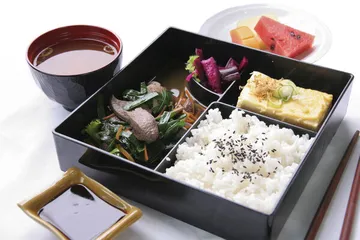Eating lunch like this will really make you fat forever
In the world of weight loss, it has been a long time to decide whether to skip breakfast or skip dinner, but whether it is the breakfast party or the dinner party, everyone firmly stated that lunch is still needed.

1: Low calories/Eat only carbohydrates
As I said before, from the perspective of nutritional balance, every meal should contain carbohydrates, protein, and fat.
But some of your lunches are like this:
Lunch a = soup powder/fried rice/Chezi noodles
Lunch b = shredded potatoes with rice, taro with rice
Lunch c= corn and other miscellaneous grains + porridge + cold dishes
Lunch d= all green vegetables
With all due respect, it's not right...
Let's not mention vermicelli rice. Miscellaneous grains, vegetables, and fruits are actually carbohydrates. What happens if people eat carbohydrates for every meal?
1: Easy to be hungry, because carbohydrates are particularly easy to digest (especially easy to convert into fat), so after eating, you either feel that you are not full, or you will be hungry after two hours.
2: It is not easy to lose weight. This involves the problem of "leptin and leptin resistance". Next time I will write specifically, I will tell you that eating a lot of carbohydrates every day will not lose weight even if you have low calories!
3: It is easy to cause skin aging. If you want to keep your skin young, you must have enough protein to support the entire skeleton.
To put it bluntly, the reason why most elderly China women have loose bodies is because they are accustomed to a lifestyle of less meat and more grains, and the vicious cycle caused by dieting once they get fat. As you get older and metabolize, this cycle cannot be changed.
2: Too little protein
A friend told me that her lunch was like this: rice + two eggs + small rapeseed.
Eat 2 eggs for lunch? There is too little protein!
As a result, Mei Zhi said: Two eggs have a total of 130 grams. Is 130 grams of protein still too little?
130g is just the weight of an egg! Protein is only part of an egg, not all of it!
Let me show you the nutritional composition table of eggs:
100g of egg actually only has 12.56 g of protein, and 130g of egg only has 16.33 g of protein.
In the same way, although meat, milk and bean products all contain protein, protein is only part of the nutrients. It does not mean that there is as much protein as you eat. You should still try to eat more meat, more tofu, and more eggs...
As for how much to eat every day, you can review it: Knowledge points| How much protein should I eat every day?
3: Slightly more fat
This kind of situation usually occurs among outer star eaters, and Jiu has been cheated many times.
Every time, I would walk in and order the vegetables with the feeling that "this house is probably lighter". As soon as the vegetables were delivered, they were again in the "Oil is worthless" series. Even the green vegetables were shining with oily luster. I asked if you were afraid?
Later, I found an opportunity to sneak into the kitchen and take a look. I found that the chef in charge of the Chinese restaurant really used all kinds of "wide oils". Not only did the meat need heavy oil, but sometimes even vegetables such as eggplant and cauliflower were fried in advance.
Because this can quickly obtain a crisp and soft taste, which meets the restaurant's requirements for fast serving and strong taste.
If you want to avoid high-fat attacks, cooking yourself is the best way.
If it really doesn't work, we can only use the water flushing method.
4: Eat too salty and spicy
Since a XX spicy rice shop was opened downstairs, Jiu can smell a strong spicy flavor at meal time... Yes, that's right, the thin colleague sitting opposite Jiu Xie ordered spicy rice again.
Although the spicy mix smells full of temptation, Jiu still refused because the heavy taste will bring two problems: the more you eat, the more you eat, the more you become swollen.
Take the spicy mix eaten by a thin colleague as an example. Although it contains